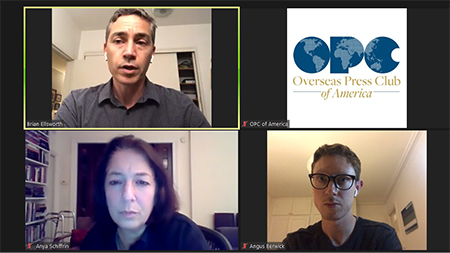Event Coverage Highlight

Joe And Laurie Dine Award Winners Reveal Risks and Dilemmas in Covering Venezuela
by Chad Bouchard
Reporters working in countries with authoritarian regimes such as Venezuela face particular challenges, not only in teasing out facts from rumor and propaganda, but in keeping sources and local journalist partners safe from dire consequences.
This year’s Joe and Laurie Dine Award went to the Reuters bureau in Venezuela for their series of articles titled “Maduro’s Venezuela,” which shed light on a system of violence, corruption and “machinery of repression.”
On Dec. 8, 2020, the OPC hosted a discussion with two of the winning team members, Angus Berwick, Reuters correspondent for Venezuela, and Brian Ellsworth, senior correspondent for Venezuela. The discussion covered some of the sticky ethical and logistical challenges the team faced as they reported on Maduro’s Special Action Force death squads, links with Cuba’s intelligence networks, how the country’s military was reshaped to serve Maduro’s vision, the fate of a Chinese rice project that fanned the flames of corruption, endemic malnutrition and stories of immigrants fleeing the country.
The moderator was Anya Schiffrin, senior lecturer at Columbia University’s School of International and Public Affairs, who served as head judge. She asked Ellsworth and Berwick how the team separates fact from fiction in a country where even basic economic information like oil exports and trade statistics are invented.
“That gets harder and harder as time goes on, because what sanctions do, like anything that’s made illegal, is it’s pushed underground,” Ellsworth said, adding that those avoiding sanctions like oil companies find creative “whack-a-mole” strategies to skirt the sanctions.
“There’s this very interesting set of games that they play. What they would first do is turn their communications systems off, so these tankers would go dark. Then they will actually invent new grades of crude, so Venezuelan crude will arrive in Malaysia, get turned into something else that doesn’t exist, and then sold to China.”
Other tactics include “identity games,” like networks of shell companies or dismantling tankers for scrap at a foreign location such as India, while keeping the ship registered in Venezuela to avoid tracking its movements. He said reporting in these conditions requires in-person photographs of tankers, or chasing down documents and inside sources.
Schiffrin asked about the dangers of reporting under the Maduro regime, which both emphasized were much worse for local reporters than for foreign correspondents.
Berwick said when correspondents report in the Venezuelan interior, there is always a risk that they will run afoul of local crime organizations. “A lot of these areas are either under control of criminal groups, or you run into some crew of soldiers who will give you plenty of trouble,” he said.
But he added that while they face the possibility of being kicked out of the country for reporting something the government doesn’t like, consequences for local journalists and sources are likely to be much worse.
Ellsworth chimed in, saying that when foreign journalists are deported, “the local producers, who no one has ever heard of, can be stuck in prison for weeks.”
Berwick said he often grapples with ethical dilemmas while reporting, continually concerned for the families they speak to. He recounted talking to a family who were subsequently visited by police who warned them not to talk with journalists. Despite the intimidation, the family still wanted to talk.
“These people want their stories told, and sometimes they do want their names attached to these stories, but if something were to happen to them that would be on your shoulders,” he said.
Berwick said he often follows up with sources long after a story was published to make sure they are safe, sometimes even helping them shift locations. He recommended that journalists in similar situations make sure to keep in touch with sources who face risks, to be available to address their concerns, to connect them with an NGO if there is a credible threat, and to provide support if they need to move.
“Even when the stories go out it’s still not really the end, and you still have to protect the people you’ve spoken with.”
You can read “Maduro’s Venezuela” here >>
Click the window below to watch a playlist of clips from the program.



